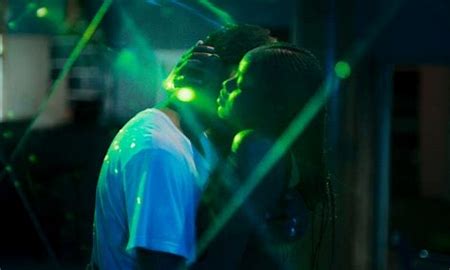
Mati Diop, niece of Senegalese filmmaker Djibril Diop Mambéty, made history with her 2019 film Atlantique. Being one of the only four women accepted into the Cannes film festival, she became the first black female director to have her film premiere in competition at the Cannes Film Festival when her film was selected to compete for the Palme d’Or and later in the festival won the Grand Prix. The film was a fictional adaptation of her documentary short Atlantiques (2009) that followed two friends from Senegal as they made a life-threatening boat crossing to Europe.

The film can be seen as a romantic supernatural drama that follows a young girl named Ada that is to be wed with a wealthy young man named Omar. The problem is that she is in love with a young construction worker named Suleiman, that flees on a boat in hopes of reaching Spain after him and his fellow coworkers have not been paid to build a tower in Dakar, Senegal. After Suleiman leaves, Ada is to be married but during her wedding Omar’s bed mysteriously catches on fire after Ada is made aware that Suleiman supposedly came back.
This first half of the film sets it up as a romantic drama that will follow the two young star crossed lovers that cannot be together due to Senegalese culture and values. But after the wedding scene, the film shifts dramatically to a more supernatural feeling. Detective Issa Diop (name choice seems to be reference to her later uncle) is then assigned to the case to figure out what set fire to Omar’s bed, yet after insisting that Suleiman committed the arsen and following Ada to prove his theory the movie takes a twist. After, it seems as though many people in the town are feeling ill and in a random moment they then become possessed by the spirits of those that died in the sea voyage to Spain. They then become what seems to be these demon like people with white irises and pupils that demand the contractor for the money they were not paid that had led them to flee to Spain in hopes for a better life. The investigator himself becomes part of this supernatural clan but the investigator unknowingly takes on the spirit of Suleiman which Ada seems to understand. They spend a night together and after the investigator comes to a realization he was the one that his body possessed by Suleiman set Omar’s bed on fire,he hands in the case to his superior declaring it closed.
A very aesthetically compelling film that emphasizes on color, movement, and sound. The first half of the film seems one with a more warm tone to the shots making it seem as though the film will be romantic drama but after the wedding scene it takes on a more dark and colder tone emphasizing the supernatural aspect. As well just as her uncle, Diop is constantly going back and forth to shots of the Atlantic Ocean and waves crashing even going so far as to end the film with a scene of the horizon line. These intermediary shots of the ocean seem to be adding into the ambiance of what is happening in the plot, as if the ocean spoke for itself being a symbol for both freedom and death.
In addition, the narrative seems exhibit Senegalese society consisting of strong patriarchy and static gender roles. But Ada is presented as this strong female character that denies this system as she is seen constantly refusing the arranged marriage and denying her then husband, Omar. As well, her inferiority is seen as she is forced to take a virginity test and then locked up by the investigator for no apparent reason. The role of religion in society s portrayed as Senegal is majority Muslim country. The girls are shown wearing hijabs in multiple scenes and when one of Ada’s friends is feeling ill, it is told to her mother that if the girl would oblige to wearing the veil and praying five times a day these types of things would not occur to her.
In what seems to be a movie about the return of those oppressed and denied their rights to pay basically having done slave work. In the form of spirits they reclaim their dignity and call it even by threatening the owner to pay up if not the building will be set on fire. As it takes on a surreal and supernatural twist, rendering it with what seems to be a dream-like aura. But it ends with the line “I am Ada” hinting at it being a somewhat real account for Mati Diop’s role in Senegalese society or her identity in general.
